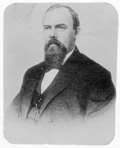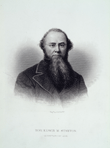

David W. Bulla’s first book, Lincoln’s Censor, from Purdue University Press, tells the story of Brigadier General Milo S. Hascall and newspaper editors like Daniel E. “Ed” VanValkenburgh of the Plymouth Weekly Democrat in northern Indiana in 1863. Hascall would suppress his newspaper and several other Democratic journals in Indiana in 1863.
First Amendment law expert Jeffery A. Smith of the University of Wisconsin- Milwaukee on Lincoln's Censor (in Journalism History): "Lincoln's Censor includes a useful bibliographic essay on the topic [of Lincoln and suppression] that indicates some of the differing interpretations by scholars. Bulla finds a temporary 'chiling effect' in Indiana but concludes that the tradition of press freedom 'survived' the many episodes of intimidation, violence, and suppression that occurred during the Civil War. Still, even if the assaults on civil liberties were fleeting and happened in a time of excrutiating turmoil, dangerous precedents were set for censorship in later conflicts."
Recent work-->Mohandas K. Gandhi was a journalist as well as an activist. Gandhi would edit newspapers for the last 44 years of his life including Indian Opinion in South Africa and Young India back home in India. David W. Bulla is the editor of the following voluume: Gandhi, Advocacy Journalism, and the Media (Peter Lang. 2023). ISBN: 978-1-4331-824-1-9.
An overview of how journalism worked in the Civil War from David W. Bulla and Gregory A. Borchard: Journalism in the Civil War Era, Second Edition (Peter Lang. 2023). ISBN: 978-1-4331-979-32.
Check out David Sachsman and David W. Bulla's Sensationalism (from Transaction Publishers). ISBN: 978-1-4128-5171-8
From 2016: David W. Bulla and Gregory A. Borchard's Lincoln Mediated: The President and the Press through Nineteenth-Century Media (from Transaction Publishers). ISBN: 978-1-4128-5570-9.
Current: Dr. Bulla is now working on a book about slavery with Karen E. Brave of the Indiana University McKinney School of Law and Rachael Scally of Trinity College Dublin. Slavery's Long Tentacles: Entanglements in Historical and Modern Forms of Slavery. It will be published by Cambridge Scholars Publishing (Newcastle-Upon-Tyne, England) in 2026.
Slavery Past, Present, and Future. Dr. Bulla is the editor of Legacies of Slavery and Contemporary Resistance. It was published in 2023 by Cambridge Scholars Publishing. ISBN: 978-1-5275-9387-9. This work is the product of presentations made at Slavery Past, Present, and Future Global Meetings. Co-editors are Karen E. Bravo, Judith N. Onwubiko, and Kremena Dimitrova.




